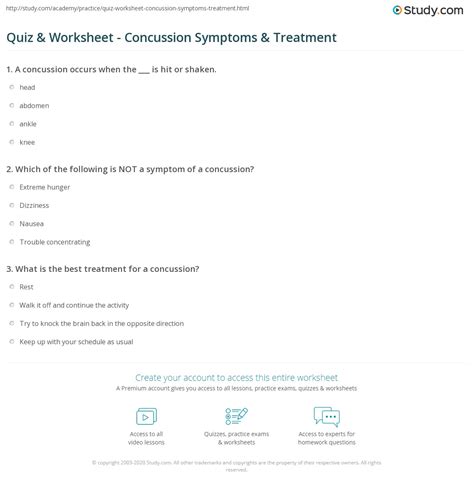Concussion Quiz: For a Healthier You
Concussions, often misunderstood as "just a bump on the head," are actually complex brain injuries that can have significant short and long-term effects. Understanding concussion symptoms and risk factors is crucial for prevention and appropriate management. This quiz isn't a substitute for professional medical advice, but it's a valuable tool to assess your knowledge and increase your awareness of concussion safety.
What is a Concussion?
A concussion is a type of traumatic brain injury (TBI) caused by a bump, blow, or jolt to the head or body that causes the brain to move rapidly back and forth inside the skull. This movement can cause the brain to bounce against the skull or twist and stretch nerve fibers in the brain, resulting in a range of symptoms. The severity of a concussion varies widely, from mild to severe. Even seemingly minor impacts can result in a concussion.
Concussion Quiz: Test Your Knowledge
Take this short quiz to assess your understanding of concussions. Remember, this is for informational purposes only and shouldn't replace professional medical guidance.
1. Which of the following is NOT a common symptom of a concussion?
a) Headache b) Dizziness c) Nausea d) Severe bleeding from the head e) Difficulty concentrating
2. True or False: Only a direct blow to the head can cause a concussion.
3. What is the best course of action if you suspect someone has suffered a concussion?
4. Can a person sustain multiple concussions? What are the potential long-term effects?
5. What steps can be taken to prevent concussions, especially in sports?
Answer Key:
-
d) Severe bleeding from the head While severe bleeding from the head is a serious medical emergency, it's not a typical symptom of a concussion itself. It indicates a more severe head injury. The other options are all common concussion symptoms.
-
False. A concussion can occur from a blow to the body that causes the head and brain to jolt. This is especially common in contact sports.
-
The best course of action is to seek immediate medical attention. This is especially important if the individual is experiencing loss of consciousness, worsening symptoms, vomiting, seizures, or unusual behavior. Rest is crucial, and avoiding further physical exertion is vital.
-
Yes, a person can sustain multiple concussions. Repeated concussions significantly increase the risk of long-term problems, including chronic traumatic encephalopathy (CTE), a progressive neurodegenerative disease. Long-term effects can include persistent headaches, cognitive difficulties (memory loss, concentration problems), mood changes (depression, irritability), and sleep disturbances.
-
Concussion prevention strategies include: Using appropriate safety gear (helmets in sports), following safety rules and regulations, proper conditioning and training to improve strength and balance, and prompt removal from activities upon experiencing any concussion symptoms.
Understanding the "People Also Ask" Questions
Many people search online for more information about concussions. Here are some frequently asked questions:
How long does it take to recover from a concussion?
Recovery time from a concussion is highly variable. Some individuals recover fully within a few days or weeks, while others may experience symptoms for several months. The severity of the injury, individual factors, and the effectiveness of treatment all play a role.
What are the long-term effects of a concussion?
Long-term effects of a concussion can range from mild to severe. Some individuals may experience persistent headaches, dizziness, fatigue, cognitive difficulties (memory problems, difficulty concentrating), and emotional changes (irritability, anxiety, depression). In more severe cases, chronic traumatic encephalopathy (CTE) can occur.
How is a concussion diagnosed?
A concussion diagnosis typically involves a physical examination, neurological assessment (checking reflexes, balance, coordination), and a detailed discussion of symptoms and history of the injury. There is no single definitive test for a concussion; the diagnosis is made based on a clinical evaluation.
What are the treatment options for a concussion?
Treatment for a concussion primarily focuses on rest, both physical and mental. This includes avoiding strenuous activities, minimizing screen time, and getting enough sleep. Over-the-counter pain relievers may help manage headaches. In some cases, physical therapy, cognitive rehabilitation, and counseling may be beneficial.
Conclusion
Concussions are serious injuries requiring appropriate care and management. By understanding the symptoms, risk factors, and prevention strategies, you can significantly reduce your risk of experiencing one and ensure a healthier, safer life. Remember, if you suspect a concussion, always seek professional medical advice. This quiz is for educational purposes and doesn't replace the need for a proper medical evaluation.

